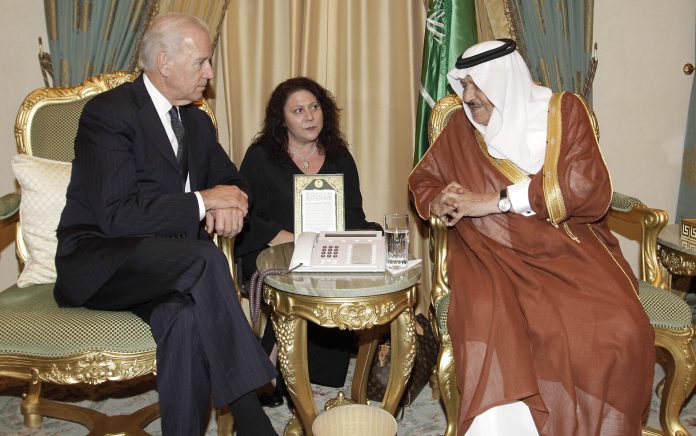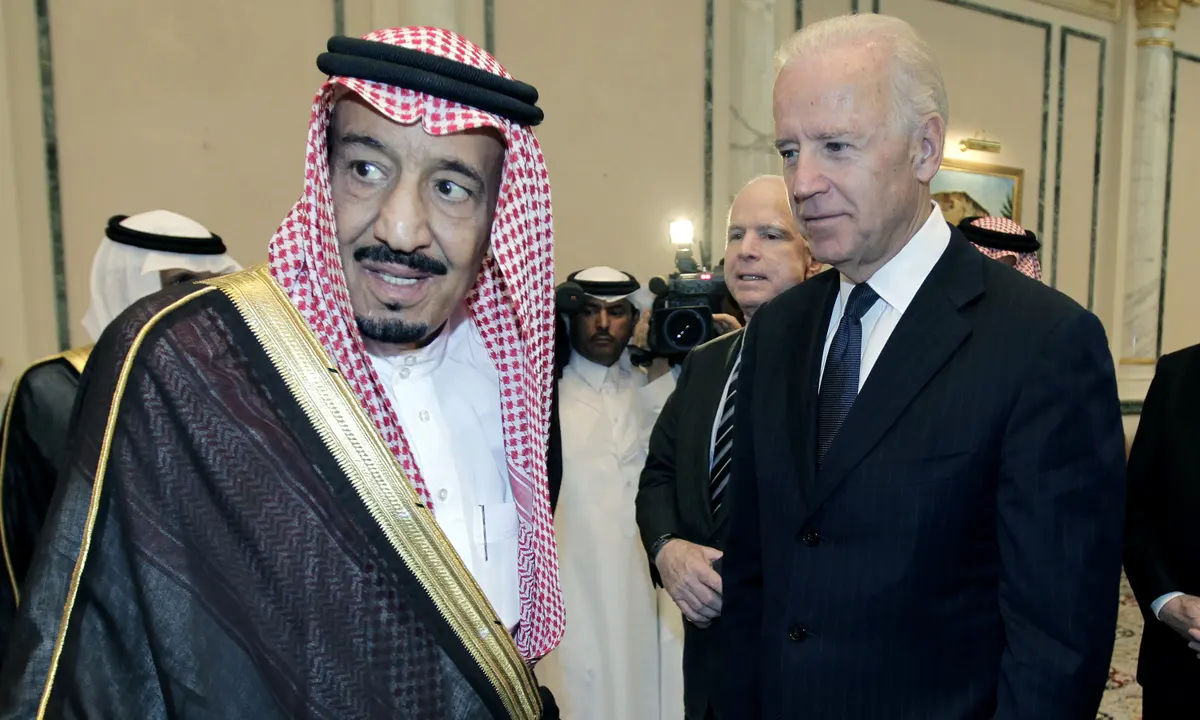
There has been increasing talk in the American capital about the necessity of returning warmth to US-Gulf relations, especially with the Kingdom of Saudi Arabia.
A weekly selection of opinions and analyses from the Arab media around the world.
The possibility of a return to warmth in US-Gulf relations
Perhaps the loudest and clearest voice came from a paper presented to the Council on Foreign Relations, prepared by Steven Cook, a researcher specializing in international relations, and Martin Indyk, a former diplomat who worked in the Middle East. As of the writing of these lines, this paper has not been published but was referred to by Fareed Zakaria in an article published in The Washington Post.
Regardless of the details of the Cook-Indyk paper, there is consensus among observers of Middle East politics that the policy pursued by the Biden administration toward the Gulf has undermined American interests. The Gulf, with Saudi Arabia at its heart, is the key to the Middle East. If you try to marginalize it, you will practically marginalize your role and presence in the region, and this is what happened with the United States.
As for Riyadh, we realize that relations with Washington were and still are strategic when they are based on clear foundations, which are those agreed upon by the founding King Abdulaziz Al-Saud with President Franklin Roosevelt. The relations were based on security, defense and economic cooperation, with full respect for the kingdom’s sovereignty and its location in the heart of the Islamic world, and noninterference in its internal affairs.
But if Washington wants to turn against these foundations and play a paternalistic role vis-à-vis the kingdom, then it must expect that Riyadh will search for other allies.
Therefore, it is a welcome change that Washington is reconsidering its stance. This will require a frank and honest dialogue between Washington and Riyadh, which will focus on two things.
The first aspect is respecting the sovereignty of Gulf states and avoiding arrogant and patronizing discourse toward its leaders. The second aspect, which is no less important, is finding a common vision surrounding the region’s most burning issues, starting with the Iranian nuclear file and the need to involve the countries of the region in the talks with Iran. – Rami Al-Khalifa Al-Ali
Putting an end to cyberbullying and cyber extortion
El Watan, Egypt, June 8
We recently learned of a tragic incident in which a 16-year-old student from Alexandria committed suicide after she had been blackmailed by someone who used a nude picture attributed to her. This comes just a few months after another incident in which a teenage girl killed herself after a man she refused to date blackmailed her family with digitally altered images of her.
Unfortunately, these incidents are more common than we’d like to think. And even more alarming is the fact that they aren’t likely to stop until the social and technological environment that allows these heinous crimes to happen radically changes.
Some believe that these kinds of incidents only take place in conservative circles or among those who are less educated. But that’s incorrect: These crimes occur even in the most liberal and educated environments with victims who come from wealthy and noble families.
Studies show that the susceptibility of male and female adolescents to cyberbullying exceeds that of older groups, and that the effect of electronic blackmail is more severe on victims of that category compared to other crimes.
For example, in 2011, a 17-year-old Canadian girl was subjected to an assault by a group of men. Despite the deeply traumatizing effects of the incident, the girl was able to recover and restore normalcy to her life.
However, two years later, when a video depicting the incident was used to blackmail her, the girl ended her life. Commenting on the condition of his daughter, the father of that girl famously said, “She was able to endure the tragedy of sexual assault, but she failed to bear blackmail and bullying.”
The magnitude and extent of the pressure that a child or adolescent is subjected to because of cyberbullying is simply unfathomable. Some victims believe their only resort is suicide. These tragic events happen in the heart of the Egyptian Delta, in the outskirts of Alexandria, as well as in the provinces of Canada and the suburbs of Paris.
In the United States, the government recently cited an “alarming” rise in suicide rates among girls aged 10 to 14 years, from 0.5 incidents per 100,000 people to 1.5 incidents per 100,000 – an increase of 200%.
Adolescent suicide incidents occur in Egypt as well as in many countries in the East and West, but these incidents have witnessed a steady increase over the past two decades, which are the two decades that coincide with the rise of social media platforms.
These platforms have given us many advantages, and have helped young people enhance their skills, engage in economic and creative activities, and pursue social integration. However, they’ve also served as hotbeds for criminal activity, including blackmail and bullying.
We need to strengthen the legislative environment related to handling cases of electronic extortion, facilitate mechanisms and procedures for reporting and prosecuting extortionists, and provide the necessary level of confidentiality for victims during investigations and trials. We also need to pay close attention to civil society organizations that can provide protection and assistance to victims of cyber extortion and bullying. – Yasser Abdel Aziz
Your Highness: With sincere greetings and respect
Al Qabas, Kuwait, June 9
I decided to direct my article directly to you, Your Highness, instead of directing it to any member of the government, since I believe that this is an urgent issue of the highest caliber and utmost importance to our nation.
In the past few years, Your Highness, Kuwait has transformed from a pioneering country to a backward country. Despite all the new roads, hospitals, universities and museums we see built around us, Kuwait has turned into an administratively backward country. Despite all the bounties that God has bestowed upon us, despite our resilient people and their ability to endure challenges and crises, we have become a weaker state.
For too many years, we’ve allowed corrupt people to go about their crimes unpunished. There are many examples of what citizens and residents suffer from because of administrative corruption.
Allow me, Your Highness, to give you just two examples, so that you understand the extent of the tragedy that has befallen our country.
First, to obtain a work permit in Kuwait, every applicant must pass a medical examination. This is a reasonable requirement. However, did you know that the average medical exam takes about 14 hours to complete? We have workers sitting and waiting under the excruciating heat of the sun for 14 hours, just to wait for their blood to be drawn.
In the age of digital connectivity and artificial intelligence, one would expect there to be an efficient appointment system that could streamline the process. The large number of visitors is not an excuse behind which the leaders of the Health Ministry can hide. The medical examination has been in place for many years, and there have been plenty of opportunities to make the service more accessible, efficient and agreeable for everyone.
Second, when an applicant goes to the Interior Service Center to apply for residency or a work permit, one of the first things they’re asked to do is to authenticate their criminal record document, which they used to enter the country. This authentication must be done at the Foreign Ministry. One would expect that if this document was used to enter the country, then it would also be accepted by the Interior Ministry when applying for a residency permit.
These are just two examples, Your Highness. There are hundreds like them, and stories abound about cases in which ministries and public institutions serve people based on favoritism, partisanship and tribal lines.
Your Highness, Kuwait was one of the most developed countries in the world, but this ranking keeps on dropping. Let’s restore that title and put ourselves back on the right track. – Faisal Mohammed Bin Sabt
A work environment that takes into account workers’ health and safety
Al-Ittihad, UAE, June 12
The decision of the Human Resources Ministry to ban manual labor during peak sun hours will take effect on June 15 and last until September 15. According to the new directive, physical labor taking place in open places between the hours of 12:30 p.m. and 3 p.m. will be banned.
READ ALSO: Türkiye: Support of Sweden, Finland to terrorists harms NATO
This is a pioneering step aimed at preserving the life, health, and occupational safety of workers. For the past two decades, the United Arab Emirates has been the only country in the region to implement protection mechanisms against work in the blazing sun, as a part of its desire to ensure a suitable and decent work environment for workers.
The labor laws adopted by the state have proven that the UAE will continue to provide all its workers with the means and tools to live in peace and stability, thus contributing to enhancing market productivity.
The UAE has proved its ability to provide a safe and sustainable environment for workers, consolidate its global position in business, and enhance its strategic position in the global economy, through policies that align the interests of employers and employees.
Existing legislation already protects workers from the dangers of occupational injuries and ensures that all workers have access to a baseline level of medical aid and hygiene measures, such as lighting, ventilation, dining and potable water.
The Health and Prevention Ministry also sets controls and conditions for the health and safety of workers in all work sites and continues to follow up on occupational risks.
The UAE, through legislation and procedures related to occupational health and safety, has built a positive work culture and instilled that culture among workers. It has paved the way for finding effective and sustainable solutions to the challenges faced in the workplace and strengthened the tools to prevent accidents and illnesses.













